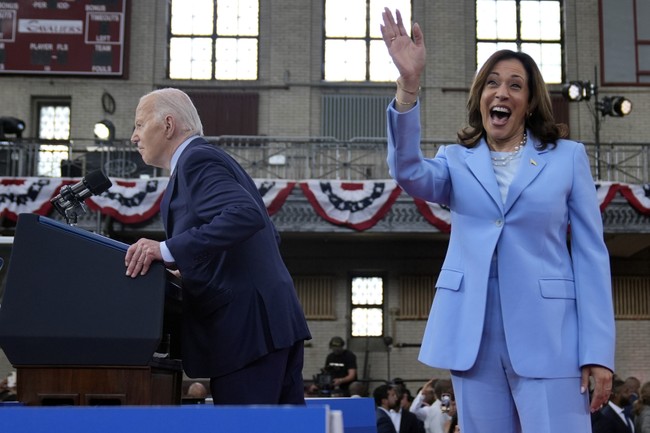Democratic Party Faces Unprecedented Shift
With Biden withdrawing from the race, the Democratic Party accelerates its process for choosing a new nominee. What happens next as delegates and leaders brace for a fluid situation?
Published July 22, 2024 - 00:07am

Image recovered from washingtonexaminer.com
Joanne Chesley, a pledged Biden delegate from North Carolina, was surprised but relieved when President Joe Biden decided to end his reelection campaign and endorsed Vice President Kamala Harris to be the Democratic Party's nominee. Many delegates, however, were caught off guard by the timing and swift execution of Biden's exit plan.
In the days following the announcement, the Democratic National Committee (DNC) rapidly advanced plans to move forward with the nomination process. Members of the DNC met to approve the slate of delegates for the party's upcoming convention in Chicago, and they are pushing forward with a virtual vote to nominate a new candidate by August 7.
The credentialing committee has confirmed the inclusion of over 4,700 delegates for the August convention. DNC Rules and Bylaws Committee Co-Chairman James Roosevelt expressed sadness over Biden's exit but assured the committee of choosing a strong Democratic nominee. This fast-tracking of the process has placed Vice President Harris in a prominent position, especially with Biden's endorsement and a growing number of party officials rallying behind her. However, Harris's nomination is not yet guaranteed. There are other potential candidates, including Pennsylvania Gov. Josh Shapiro and North Carolina Gov. Roy Cooper, who could emerge in the race.
The potential for a 'mini-primary' process has been suggested to ensure a democratic approach rather than a straightforward coronation of Harris. Some delegates, like 19-year-old David Seaton-Lorenz from Massachusetts, believe that Harris should campaign for their votes to strengthen her position as the nominee.
In light of Biden's withdrawal, the 4,000 delegates pledged to him are now technically free agents. While Biden's endorsement of Harris will heavily influence their decisions, delegates have the liberty to support other candidates. This circumstance creates the possibility of a contested convention, scenarios not seen since 1952. States like Michigan, which held early primaries, now find their delegate commitments rendered moot, as the delegates can vote for any candidate moving forward.
Several key leaders have endorsed an open nomination process to bring clarity amidst the uncertainty. Former Speaker Nancy Pelosi supports an open process to choose the next nominee, signaling the importance of a transparent and inclusive method. Election law expert David Becker emphasizes that despite Biden's significant delegate lead, the Democratic Party did not have an official nominee, and the delegation process will ultimately determine the new candidate.
The DNC is prepared for multiple scenarios, including the potential of a virtual roll call vote to nominate Harris, which could streamline the process and avoid a potentially messy convention. Yet, there is considerable debate over whether this would be the best course of action.
Meanwhile, the political ramifications of Biden's withdrawal extend beyond the nomination process. The money raised by Biden's campaign will likely transfer to Harris's campaign if she secures the nomination. If another candidate emerges, the funds could be transferred to the DNC or other political action committees to support the eventual nominee.
At the state level, elected officials and superdelegates from Michigan and other key states will play crucial roles in the nomination process. Governors, party chairs, and other political figures will weigh in, aligning with the sentiments expressed by the delegates they represent.
Given the rapid pace of developments, DNC Chairman Jaime Harrison promised a transparent and orderly process to bring the party together behind a candidate capable of defeating former President Donald Trump in the November elections.
As the Democratic Party navigates this unprecedented political terrain, the outcome will not only shape the 2024 election but also set a new precedent for future nominating processes in American politics.






